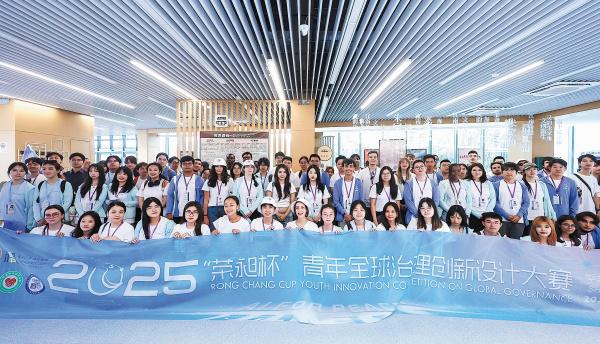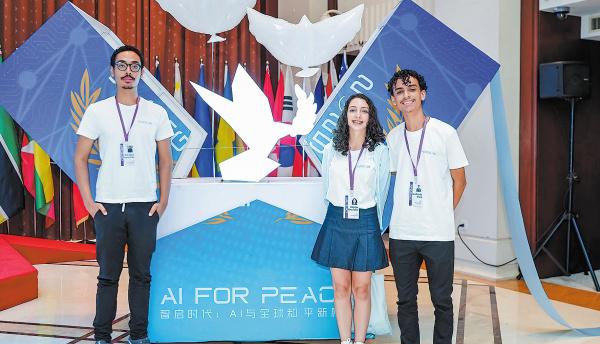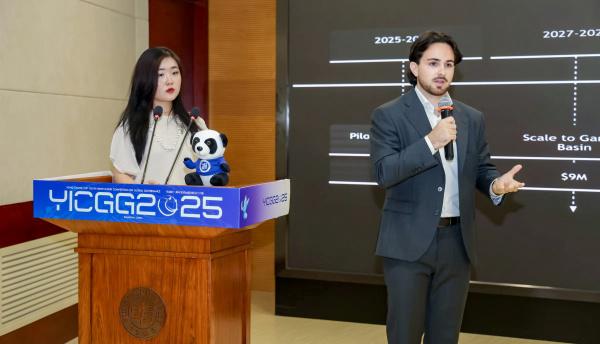
Ninety participants from 38 countries take part in the finals of the 2025 “Rong Chang Cup” Youth Innovation Competition on Global Governance, held at Fudan University in Shanghai from July 23 to 28.(Photo provided to China Daily)
Themed “AI Governance for Tomorrow: Peace, Trust and Inclusion”, the finals of the 2025 “Rong Chang Cup” Youth Innovation Competition on Global Governance (YICGG) concluded at Fudan University in Shanghai on July 28.
The event brought together 90 participants from 38 countries. They explored ways to build a community with a shared future for mankind and translate the United Nations Sustainable Development Goal of “peace, justice, and strong institutions” into timely solutions and youth-led initiatives.
The competition encouraged participants to light the beacon of AI for world peace through practical governance proposals and ethical institutional innovations.
The finalists, selected from 325 preliminary contestants, were randomly assigned to 12 teams. Over six days, they took part in guided discussions, case analyses, and solution design, showcasing the younger generation’s confidence and responsibility in co-creating global governance.

Ninety participants from 38 countries take part in the finals of the 2025 “Rong Chang Cup” Youth Innovation Competition on Global Governance, held at Fudan University in Shanghai from July 23 to 28.[Photo provided to China Daily]
Guided by the Chinese People’s Association for Friendship with Foreign Countries, the event was jointly hosted by Fudan University and Shanghai Rong Chang Public Welfare Foundation.
Organizers noted that AI governance is crucial to the future of humanity and called on young people to take on greater responsibilities, stand at the forefront, and contribute innovative, inclusive, and forward-looking plans.
“The young participants were intellectually active, proposing a large number of innovative solutions from various dimensions — such as early warning for conflicts, social reconciliation, and harmony in international relations,” said Su Changhe, dean of Fudan University’s School of International Relations and Public Affairs. “They demonstrated the infinite possibilities of AI in advancing peaceful governance.”
The “Most Valuable Project” award went to a team from China, Pakistan, Georgia, Colombia, Japan, and Thailand. Their proposal, “GAIA Voice”, is a global AI system integrating ecology, community, and technology to address climate change and resource management crises, while promoting global ecological peace and sustainable development.
Inspired by Chile’s decade-long drought and the decline of bee populations, the system monitors bee sounds in real time to detect pollination crises and guide farmers in scientific irrigation and planting, the team said.
The system features five core functions: natural-human translator, AI warning mechanism, ecological guardian, restoration planner, and ecological peace narrator. Together, they promote deeper interconnection between humans and nature, paving the way for intelligent ecological governance and cross-border cooperation.
Another team, from Japan’s Tokyo University and Sweden’s Chalmers University of Technology, also drew wide acclaim for its plan to deepen research on ocean carbon sinks to support carbon neutrality strategies.
Their project proposed an AI-driven monitoring and prediction system based on long-term observation data of recalcitrant dissolved organic carbon in Tokyo Bay.
They said the project aims not only to improve the transparency and accuracy of ocean carbon accounting but also to serve as a platform for regional cooperation in East Asia, fostering cross-border sharing and technological trust, and providing data support and institutional innovation for global climate peace governance.
A third team, with members from Sweden, Indonesia, Montenegro, and other countries, focused on humanitarian crises caused by the mismanagement of emergency supplies following natural disasters. They proposed using an AI system to optimize crisis warnings and the allocation of emergency resources as a peacekeeping strategy.

Ninety participants from 38 countries take part in the finals of the 2025 “Rong Chang Cup” Youth Innovation Competition on Global Governance, held at Fudan University in Shanghai from July 23 to 28.[Photo provided to China Daily]
Shaping tomorrow
Khun Sint Phoo Wai, a participant from Myanmar studying at Thailand’s Rangsit University, was named “Ignite Talk Queen” during the event.
“If AI is to be involved in peace education, we humans have the responsibility to educate AI on what peace is first,” she said. “‘AI for Peace’ advocates not a unified narrative on a global scale, but mutual inclusiveness, equality, and respect — combining universal principles with regional experiences.”
Three participants from China, Mozambique, and Canada read out the “We Youth Common Agenda” on behalf of all contestants. The document was distilled from nearly 150 core viewpoints proposed in the preliminary round and refined through extensive discussions among the finalists.
“It reached a youth consensus on several dimensions, including how to empower AI for peace, how to address peace threats in the AI era, how to establish peace primarily through the UN, and the role of youth in AI’s future governance,” said Laura Dias Tapa Mafinda from Mozambique, a graduate student at the University of Chester in the UK.
During the event, participants also engaged in diverse exchanges, discussions, and field investigations, gaining firsthand experience of AI’s role in contemporary social governance.
Since its launch in 2007, YICGG — jointly initiated by Fudan University and the UN Development Programme — has drawn more than 3,200 contestants from 110 countries and regions, who together have submitted nearly 1,200 governance proposals.
![]()
![]()
www.ecns.cn (Article Sourced Website)
#Global #youths #empower #world #peace
